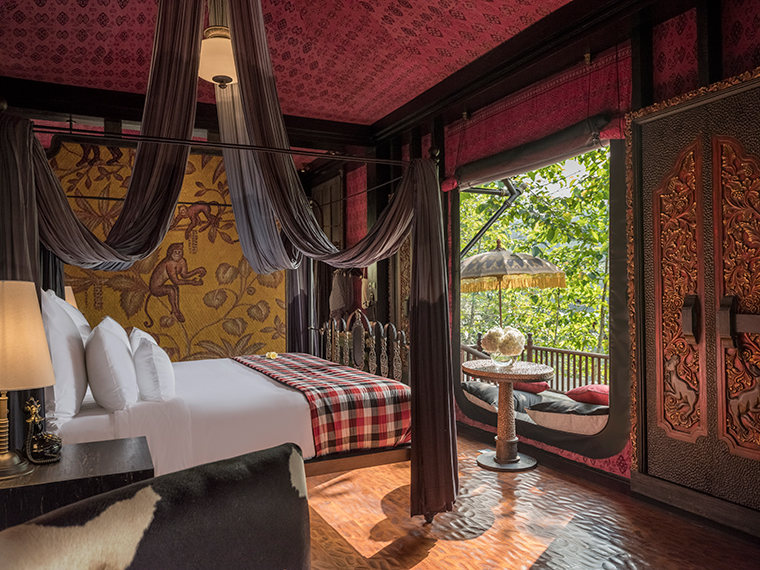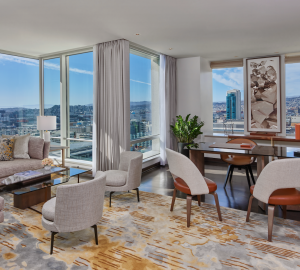Feathers fly amidst the men’s cheering and jeering. The fight ends barely seconds after it has started. The winner, covered in blood, is scooped up by his happy owner with pride and relief, while the limping loser is given a quick release through a decisive twist of his neck delivered by one of the men in the pit. I am witnessing a cockfight, one of Bali’s oldest traditions still in practice in villages. The arguments for it are tradition and that blood spill is necessary to appease evil spirits that would otherwise harm the villagers. So, on this day, most of the men in the village of Taro in the Keliki valley have gathered for this ceremony (and to wager in the cockfights). I wouldn’t have a chance to see such an event by staying on the beaten tourist track in Ubud. But I am out on a two-hour jungle trek organised by luxury resort Capella Ubud, and it so happens that the villagers of Taro are holding a religious ceremony for a Hindu demigod that day.
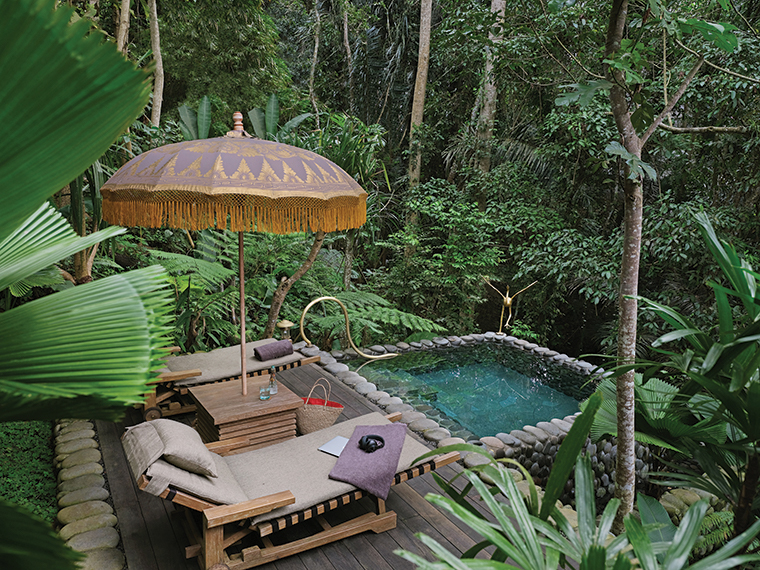
Capella Ubud, a Leading Hotels of the World member, is vastly different from other properties in the Island of Gods in both concept and guest offerings. First of all, its location means better accessibility for guests who want a more immersive experience into the heart and soul of Bali. Set in a lush rainforest in a valley surrounded by rice terraces with views overlooking the sacred Wos River, it is 20 minutes away from Ubud city centre by car. Besides farming villages like Taro and Tak Tak, it is also home to an artist village with its own unique style of drawing and painting developed in the 1970s, with idyllic scenes of traditional Balinese life or Hindu mythology.
A tent like no other
If its location offers a refreshing change for frequent Bali visitors, the narrative of Capella Ubud, designed by Bangkok- based American architect Bill Bensley, is in another league of its own. In building his 23-key tented camp, Bensley took inspiration from the European settlers who came to the Indonesian archipelago in the 19th century. And thus the 22 one- bedroom tents and one two-bedroom lodge are themed on the different trades that would make up an expedition party, such as a Photographer’s Tent, as well as a Cartographer’s Tent, for instance. I stay in the Toy Maker’s tent, which is filled with wooden toys and paintings of toys and games.
The cynic might smirk at the concept, but those familiar with Bensley’s style know better than to laugh. For Bensley’s creations are no child’s play. Such attention is paid to details that even the most jaded end up falling in love with the fantasy he creates. The architect pays tribute to the host destination through the use of local materials and design.
For Capella Ubud, he covers daybeds with saput poleng, a black and white checkered cloth that the Balinese use to wrap tree trunks, rocks, and statutes. The dimpled flooring in all the tents is made out of dark teak from Central Java and the stand-alone baths of hand-hammered copper. The spacious all-wood bathroom is a story in itself (and we are not even talking about the spacious patio-sized al fresco bath). The toilet here is literally a throne. Fashioned out of solid wood, the toilet is designed to look like one, and comes with a leather-upholstered lid. Some toilets are also topped with antlers. Outside the tent is your own saltwater pool, where there are spacious sun loungers for you to while away the hours. But, you may want to spend more time inside your tent (where a well-stocked drinks cabinet with cut-glass crystal might lure you to stay in) and elsewhere in the estate are sybaritic distractions aplenty.
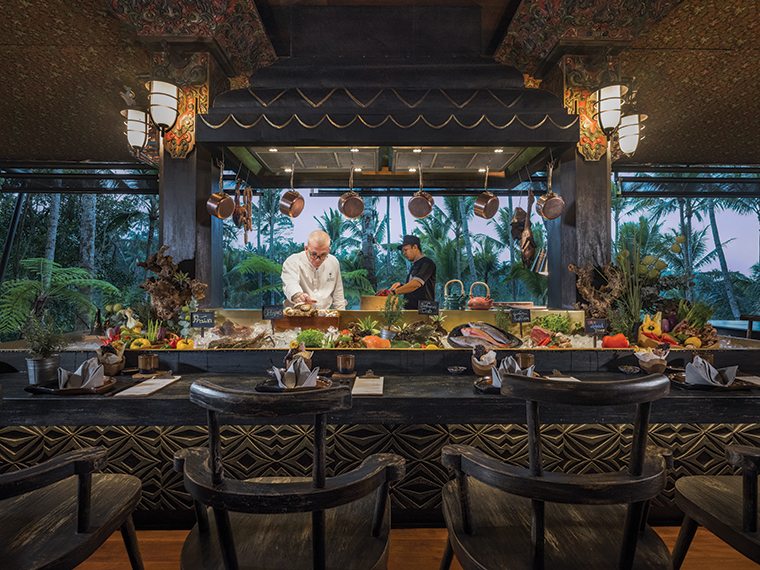
The main restaurant named after Mads Lange, a Dutch spice trader who had come to Bali in the 19th century, serves the most wonderful breakfast spread with an array of health shots and healthy smoothies to start. I have the Japanese bento set, which comes with raw fish sushi two days in row. Downstairs is Api Jiwa where culinary director Matt McCool has devised a robatayaki menu that showcases local ingredients in 10 delectable courses, omakase style. Particularly remarkable is the kimchi-wrapped duck satay where the fermented vegetable cuts through the taste and texture of the meat.
Book yourself into Auriga wellness spa, which offers a wide range of treatments. You may want to check out the hotel’s specialty treatments – the “moon” massages, which are adapted according to the lunar cycle. As it is a new moon and therefore a time for renewal and introspection, I have a full body massage using rosemary and eucalyptus oils, which are known to be revitalising.
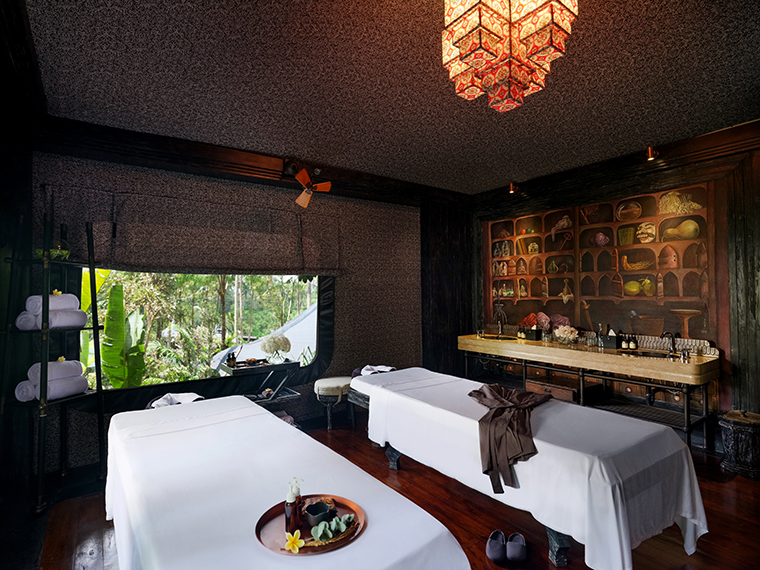
When local meets luxe
Beyond the estate, there are also plenty to explore and discover. Despite the gritty bits that one might chance upon while seeing the raw side of Bali (like I did in my jungle trek), all excursions by Capella Ubud are done in style and luxury. At the end of my two-hour trek, I sat down to a generous gourmet picnic overlooking verdant rice terraces (staff from the hotel went ahead in a car to set up). Guests can also opt for mountain biking trips or hikes up Mount Batur. Those who want to connect with their spiritual side can take part in cleansing rituals and water blessings at Camp Pura, an on-site temple next to the sacred Wos River. Art lovers may visit artists’ ateliers; I Wayan Ariana is a famous artist and teacher who works closely with Capella Ubud. Food lovers might want to go on culinary journeys to coffee plantations and do chocolate tastings. The list goes on.
Or you may choose to do nothing but luxuriate in Capella Ubud’s lush surroundings and enjoy the gifts of Mother Nature, like I do upon waking one day. Stepping out of my tent into the first light of the morning, I am struck by the beauty of the scenery before me. The surrounding greenery glistens with morning dew. As birdsong fills the air, my heart swells with the anticipation of a great day ahead.



